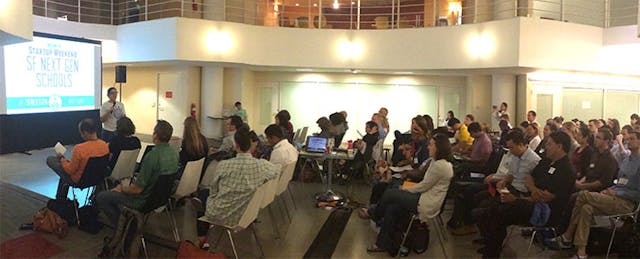Surrounded by arcade games, whiteboards, and loads of open space at Zynga’s headquarter, 110 brave participants tried their hand at redesigning school last weekend in the second annual SF Startup Weekend EDU: NextGen Schools.
Last year, imaginations ran wild, resulting in school models like Hogwarts Academy and The Magic School Bus. This year’s school models leaned more on the practical side.
Organized by Silicon Schools Fund founder Brian Greenberg, the weekend kicked off with a simple game of rock-paper-scissors, before participants turned to the more difficult task at hand, school.
The challenge: Design a new school model that includes some aspect of personal learning--in 72 hours. At the end, pitch your school model--complete with bell schedule, staffing plans, financials, and other operational plans--to a panel of seasoned educators and investors in four minutes.
Over 60 educators (compared to 40 who attended last year) devoted their weekend and $100. These educators included members from local charter schools including Navigator Schools, Caliber Schools, Alpha Public Schools, and Design Tech High School, eager to use the weekend as a testing ground for new ideas they could bring back to their schools. Other participants included lawyers, CPA’s, and even a few Google employees all excited to tackle school design.
On Friday evening, 50 people stood up to pitch their ideas. After a voting process, 12 teams were formed. Many of their ideas were grounded in practical issues such as giving students control over how they learn, addressing social and emotional needs, and finding creative ways to connect to the real world learning.
Some ideas appeared to be more about products than schools. This approach came under fire from judges who asked questions like “Why is this a whole school model and not a product that a school can adopt?” Creating a school model solely to pilot product surely seemed to many like an expensive endeavor.
At the end of the weekend, two teams rose to the top.
- First place: Hired Education, a school model using paid internships, this high school would focus on giving students college savings accounts, while also building financial readiness, social capital, and academic skills to increase the likelihood students would go to and stay in college.
- Second place: Incubator Academy, a high school focused on teaching students real marketable skills, through internships with startups who would share campus space with the school.
Both focused on giving student exposure to real world experiences by working closely with companies. Internship or apprenticeship, whatever you call it, it’s an idea that goes way back to trade guilds of the middle ages.
But only Hired Education walked away with take-home prizes, which include one-on-one consulting services with the California Charter School Association, three free hours of consulting with Peter Laub at EdTec (a $1000 value), $1000 towards bringing the team to New Orleans for three days of coaching from 4.0 Education Incubator. And if they’re serious and ready, a pitch to Silicon Schools Fund for a seed grant.
The Hired Education team, was made up of many people already working at blended learning focused schools in the San Jose such as Will Eden (Entrepreneur in Residence at Alpha Public Schools), Kevin Sparks (Principal at Alpha Public Schools), Amanda Zimny (Vice Principal at Alpha Public Schools), Francisco Castillo-Fierro (Director of Blended Learning at Cristo Rey San Jose High School) and Ron Delany (Teacher at Summit Denali). Also rounding out the team were Klara Crean (After School Program Designer from Sonoma) and Nick Arnold (lawyer).
The team originally started with an idea Eden hopes to implement in a new high school that Alpha hopes to open in fall 2015. However, the charter has yet to be approved by the Eastside District.
“We knew at a high level that we wanted to do paid internships, funneled into a college savings account, but we hadn’t figured out the details about what this means before this weekend,” says Eden.
With the help of his team, Eden was able to flesh out the details of his model. They borrowed many ideas from the Cristo Rey schools, which already uses internships to help students pay for the school’s tuition through a work study program.
The team also stumbled on a compelling statistic that reinforced the need for a model that gets students both academically and financially ready: Students who save at least $500 before they go to college are five times more likely to actually attend.


